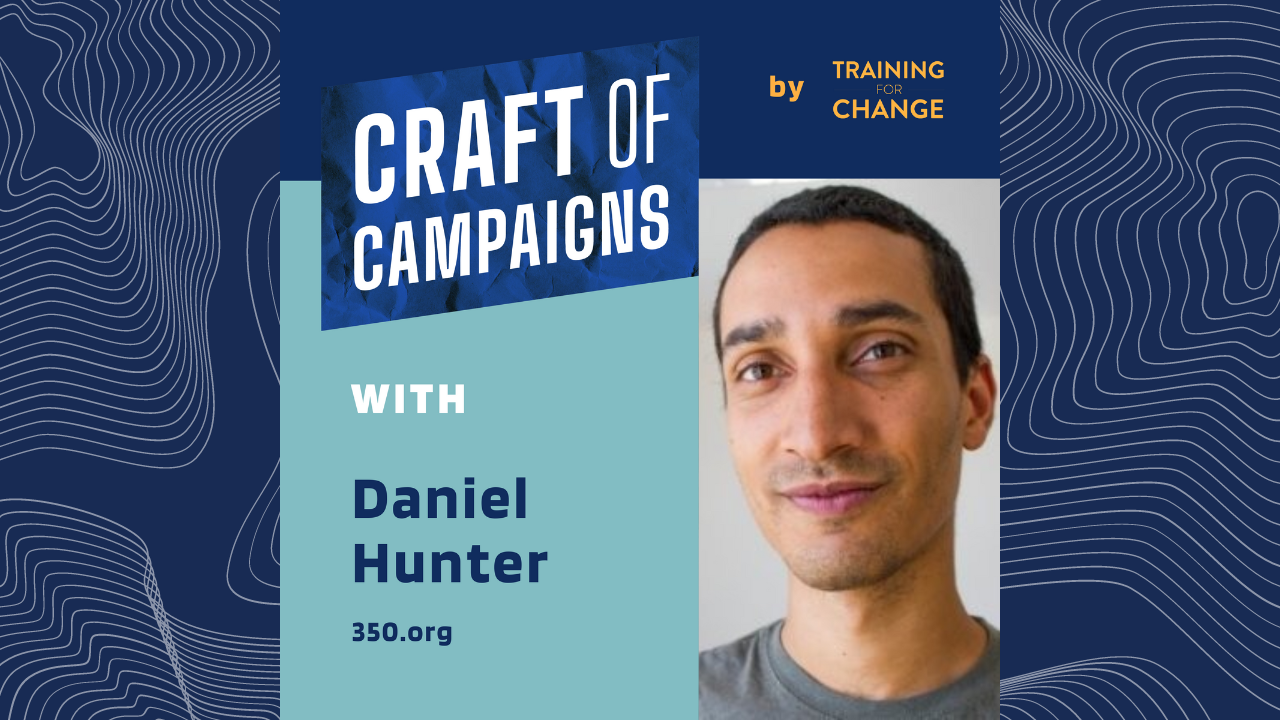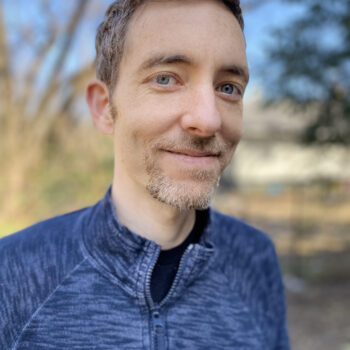The Craft of Campaigns podcast highlights stories and lessons from issue-based direct action campaigns beyond one-off mobilizations and single election cycles. Campaigns channel grassroots energy to win concrete victories, build winning coalitions, and topple pillars of power standing in the way of justice. In each episode, we interview organizers about how a campaign unfolded, the strategy decisions they made, and the lessons we can draw for our current moment.
For this Craft of Campaigns podcast, I talked with Daniel Hunter of 350.org. You can read the writeup below or check out the full episode here or at Apple Podcasts, Spotify or wherever you get your podcasts.
Since the Great Recession, over a dozen states have legalized gambling. In 2023 alone, the New York state government is expected to approve three new casino developments with a minimum $1.5 billion capital investment. Researchers have documented waves of harm to low-income, BIPOC communities following the opening of casinos, from gambling addiction to plummeting real estate values. That’s why Philadelphia community organizers were alarmed when the state legislature, at the urging of Democratic Gov. Ed Rendell, voted to approve casinos at a midnight session on the Fourth of July in 2004. Two years later, with a newly-appointed gaming control board months away from its late 2006 deadline for reviewing casino development applications, a few of those organizers launched a new organization: Casino-Free Philadelphia.
They wanted to stop or at least scale down the proposed casino developments to minimize their harm on working-class neighborhoods. The group initially focused on influencing the new statewide regulator, the Pennsylvania Gaming Control Board (PGCB), which was charged with choosing among casino company proposals to build two casinos in the city. But PCGB members — who had been appointed by pro-casino Governor Rendell — conducted much of their work in secret. The board denied organizers’ requests for information. When activists attended a public hearing to ask questions, the board abruptly ended the hearing.
Casino-Free launched a grassroots direct action campaign combined with a legal strategy to make the development process so costly that developers would be forced to scale back their plans. To do that, Casino-Free needed to turn more Philadelphians against casinos. Organizers quickly realized their biggest challenge was convincing residents that casinos would bring harm to their neighborhoods. Within Philadelphia, most residents seemed to agree that casinos were coming, no matter what. But the group had noticed that residents were often frustrated by the gaming board’s unwillingness to share basic information that had been collected about the casino development proposals, such as how much car traffic they might generate.
Casino-Free decided on a pro-transparency campaign demand for the board to release all documents related to projected casino costs and revenues along with the casino site plans within six weeks (just before the PCGB’s deadline to review casino proposals). The group threatened to conduct a “citizens’ document search” at the board’s headquarters if the agency didn’t comply. They also tried to earn TV coverage by incorporating theater into the campaign. At a press conference announcing “Operation Transparency,” as they called the ultimatum,, Casino-Free organizers led reporters inside the building that houses Governor Rendell’s Philadelphia office. They asked to fax their demand to PGCB Chairman Tad Decker. “It wasn’t anti-casino,” Casino-Free strategist Daniel Hunter told me later. “It wasn’t, ‘This is good development, [this is] bad development.’ It was a simple story of…access to information.”
The ultimatum put the board in a bind: release planning documents that would almost certainly reveal some of the potential downsides of casinos or continue to demonstrate its commitment to protecting the interests of casino billionaires rather than the public. The board chose more secrecy, refusing to release any documents. Casino-Free countered with… more theatrical protest. Organizers invited Philadelphians to join a symbolic action washing the windows at state offices downtown “to make them more transparent,” which generated even more interest from reporters. One local columnist broke with the establishment media’s “done deal” narrative and pledged to join the document search. The week of Thanksgiving, Casino-Free held another protest giving thanks for whistleblowers, encouraging state employees to leak the documents to the public.
The day before the December 1st deadline, the PCGB released some but not all of the documents. “But we said, ‘No, it’s all or nothing,’” recalled Daniel. Several candidates for local office and one sitting councilmember attended the group’s press conference on December 1st to announce they were supporting the document search plan.
In the next week, Casino-Free trained dozens of new recruits in civil disobedience, and on December 11, fourteen attempted to enter the board’s offices in Harrisburg, with dozens more who bussed in from Philadelphia cheering them on. Their arrests generated headlines around the region, and the tone of the news coverage changed from, “Why protest a done deal?” to “What is the PGCB hiding?” For the first time, reporters began consistently publishing stories highlighting the possible negative impacts of casinos.
Ten days later, the gaming board approved two proposed casinos to be built along working-class riverfront neighborhoods. But by then the tide of public opinion was starting to turn, giving the organizers the confidence to attempt a campaign that would severely curtail the casinos.
Casino-Free turned to the city’s zoning rules as the next source of leverage. With the May 2007 municipal elections looming, they had about a month to collect the 20,000 signatures needed to put a ballot amendment before voters that would ban casinos within 1,500 feet of residential communities, schools, playgrounds, and places of worship — effectively barring casinos within city limits. The six-week campaign, which they called “No Way Without Our Say,” collected 27,000 signatures. But when a casino company challenged the signatures, an elected judge threw them out without examining them, alleging fraud.
“We got pretty used to losing in courts. We lost, I think, 15 or 16 different court battles,” Daniel told me later. “We were real good at losing. But losing isn’t the problem; giving up is the problem. We told people, ‘These signatures were real and you know it.’ So we went to [the] City Council and we said, ‘You saw us in the streets, you saw us in the subways, you saw us in the coldest of winter gathering signatures. You know they’re real Philadelphians, and they vote.’ We also showed them numbers in their district of who we had gotten as further evidence and further pressure.”
The organizers’ appeals to the City Council worked, and they unanimously added the measure to the May ballot. But casino companies sued the City Council, and again, less than a month before the election, the State Supreme Court threw out the ballot measure.
Over and over, elected judges — many of whom had received campaign funding from pro-casino donors — refused to let Philadelphians even weigh in on the question of casinos. Their refusal only further turned the general public against casino companies, which came to be seen as allied with unaccountable, possibly corrupt state officials. Casino-Free organizers calculated that if they continued showing they were on the side of transparency and public input, they would keep moving more of the public against casinos, with elected officials to follow. During trainings for members, Casino-Free organizers described politicians as “balloons” tied to the “rock” of public opinion. The goal of their campaigns, as Daniel Hunter explained to me later, was to “move the rock, not the balloon — elected officials who want to keep their jobs can sway only so far from public opinion.”
So they decided to make sure Philadelphians could still vote on casinos on May 15 by hurriedly designing and printing dozens of four-foot-tall red and white cardboard ballot boxes, which they printed with the words “Philly’s Ballot Box.” On Election Day, hundreds of volunteers staffed them at polling places, public parks, and transit stations, allowing any Philadelphian to weigh in on the proposed 1,500-foot buffer ordinance. Most elected officials running for office that day participated too, including future Mayor Michael Nutter, who pledged to consider it a binding referendum. Nearly 60% of all voters participated, with 95% voting in favor of the buffer.
Through these three short campaigns waged over six months, Casino-Free organizers radically changed public perception of casinos. Most Philadelphians now understood that there were mechanisms to keep casinos out of their neighborhoods. And the group’s activism inspired news outlets as well as elected officials to call into question the real costs and benefits of casinos to the city, further causing a slide in public support for casinos.
The battle to stop casino developers continued for another three years. Organizers ultimately succeeded in stopping one of the casinos entirely. The other was forced to open at only one-third its original size.
As with the fight against Amazon’s proposed second headquarters, Casino-Free organizers had their work cut out for them in convincing a skeptical public that the development would be bad for their neighborhoods. They found success using creative tactics that went beyond marching and rallying. Rather than simply campaigning against casinos, they campaigned for transparency and public involvement, which ultimately won them more support than a straightforward opposition narrative would have. And the group demonstrated an uncommon ability to accept legislative and court losses without giving up.
There are even more takeaways for campaigners in my conversation with Daniel Hunter on the Craft of Campaigns podcast. He also published an excellent book-length accounting of the campaign, Strategy & Soul.

